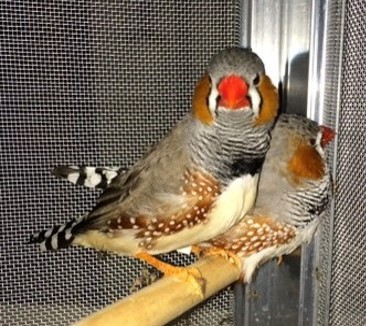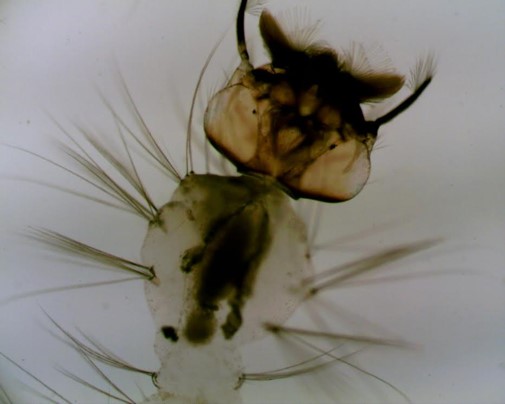Phoebe D. Edwards
Anyone who has been outdoors with other people can tell you that mosquitos bite certain individuals more than others. But what is it about some types of blood that they prefer?
Researchers in the Martin Lab at the University of South Florida are investigating how hormones in the blood may influence mosquito feeding preferences. These hormones are glucocorticoids, a class of steroid hormones that are released from the adrenals and circulated throughout the body during times of stress. Stephanie Gervasi, a postdoctoral researcher in the group, is examining how concentrations of these stress hormones affect how often hosts are bitten by mosquitos.
Using the zebra finch as a model species, Gervasi and colleagues1 set up a series of enclosed cages containing three birds, each bird with a different amount of circulating stress hormones. To directly control hormone levels, the researchers implanted tubes of corticosterone (the primary glucocorticoid in birds) under the skin of finches. The implant would slowly release either a high dose, middle dose, or no dose of hormones into the blood stream of the zebra finches. Then, a swarm of 50 southern house mosquitos was released into each enclosed area and allowed to feed freely on any of the three finches in the cage. After 12 hours, the mosquitos were vacuumed out of the bird cages and ground up so that their blood meals were released. The researchers then used microsatellite DNA- unique, identifying portions of the birds’ genomes extracted from the blood meals- to identify which birds the mosquitos fed on.

Gervasi found that significantly more blood came from individuals with the implanted stress hormones: mosquitos tended to feed on the stressed hosts more.
But what is it about the stressed hosts that is so appealing to mosquitos? It was not that stress made the birds more sluggish, easy targets. On the contrary, high corticosterone finches were more active overall and engaged in higher rates of behaviors like preening and fluffing feathers, which should be mosquito-defensive. Yet, the finches’ vigilance did not seem to help them, and could be backfiring by making them appealing to the mosquitos in another way. Gervasi suggests, “the birds that are more behaviorally active could also be more metabolically active… and this would actually draw the mosquitos towards them.” Another idea was that the myth of “sweet blood” could have some basis in reality. “Birds with higher levels of corticosterone have higher levels of blood glucose” says Gervasi, which could be attractive to the mosquitos. However, subsequent analysis showed that there wasn’t a strong correlation between the blood glucose levels of the host and feeding preference of the mosquito.
Since stressed blood is so appealing to mosquitos, the researchers wondered if consuming it had some benefit. They followed up with a study examining whether feeding on the stressed birds induced any reproductive changes in the mosquitos. To test this, mosquitos were allowed to feed on a finch with a specific dosage of corticosterone, and then were removed to a separate container to lay eggs. The results revealed something frightening: mosquitos that fed on stressed hosts (high corticosterone dosage) went on to lay more eggs, and also laid them more quickly after taking the blood meals. This implies that feeding on stressed hosts may lead to larger mosquito populations.

It is still a mystery as to how the stressed blood increases mosquito reproduction. To figure out what, exactly, it is about the blood of stressed hosts that benefits the mosquitos, researchers in the Martin Lab plan to spike blood samples with various compounds of interest and see how the mosquitos respond.
They also plan to examine the effect of stress hormones in blood on the viruses transmitted by mosquitos. There is evidence that viruses survive longer in stressed hosts, and if mosquitos tend to feed on stressed hosts more, Gervasi and colleagues speculate that there could be an amplification effect of harmful viruses such as West Nile in stressed populations. Furthermore, if mosquitos feeding on stressed populations lay more eggs, they would explode in number more quickly than those feeding on healthy, unstressed populations.
While the Martin Lab is busy solving these mysteries, perhaps the rest of us have just gotten another reason to work on keeping our stress levels down.
Gervasi presented this research at the 2016 annual meeting of the Society for Integrative and Comparative Biology in Portland, Oregon.
1Collaborators involved in these studies: Nathan Burkett-Cadena, Aaron Schrey, Jeanette Miller, Laura Hebert, Sarah Burgan, Hassan Hassan, Tom Unnasch (Primary Investigator), Lynn Martin (Primary Investigator).

